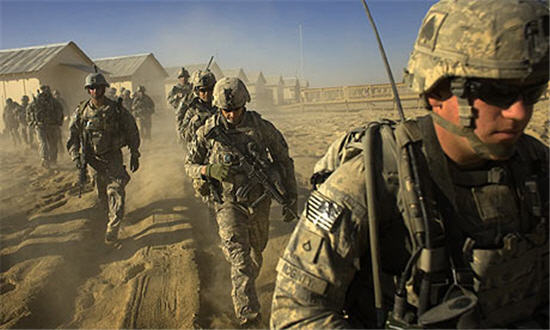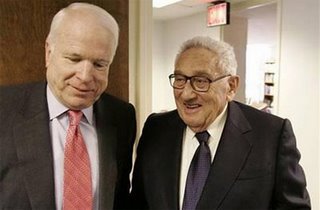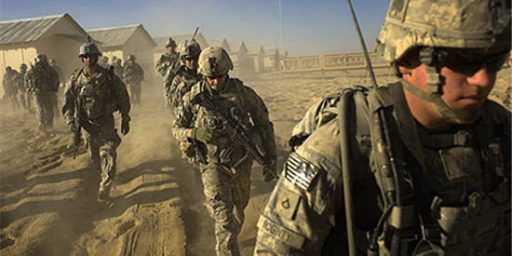Afghanistan: A War Without End
According to reports, the Obama Administration is set to abandon the July 2011 withdrawal deadline that was set earlier this year.
According to a new report, the Obama Administration is on the verge of taking the July 2011 “beginning of withdrawal” timetable off the table in its latest review of U.S. policy in Afghanistan:
WASHINGTON — The Obama administration has decided to begin publicly walking away from what it once touted as key deadlines in the war in Afghanistan in an effort to de-emphasize President Barack Obama’s pledge that he’d begin withdrawing U.S. forces in July 2011, administration and military officials have told McClatchy.
The new policy will be on display next week during a conference of NATO countries in Lisbon, Portugal, where the administration hopes to introduce a timeline that calls for the withdrawal of U.S. and NATO forces from Afghanistan by 2014, the year when Afghan President Hamid Karzai once said Afghan troops could provide their own security, three senior officials told McClatchy, along with others speaking anonymously as a matter of policy.
(…)
What a year ago had been touted as an extensive December review of the strategy now also will be less expansive and will offer no major changes in strategy, the officials told McClatchy. So far, the U.S. Central Command, the military division that oversees Afghanistan operations, hasn’t submitted any kind of withdrawal order for forces for the July deadline, two of those officials told McClatchy.
The reasons for such a shift in policy, it is being claimed, include the fact that the Afghans are no where near being ready to defend themselves, and concerns about the Pakistanis:
“During our assessments, we looked at if we continue to move forward at this pace, how long before we can fully transition to the Afghans? And we found that we cannot fully transition to the Afghans by July 2011,” said one senior administration official. “So we felt we couldn’t focus on July 2011 but the period it will take to make the full transition.”
Another official said the administration also realized in contacts with Pakistani officials that the Pakistanis had concluded wrongly that July 2011 would mark the beginning of the end of U.S. military operations in Afghanistan.
That perception, one Pentagon adviser said, has convinced Pakistan’s military — which is key to preventing Taliban sympathizers from infiltrating Afghanistan — to continue to press for a political settlement instead of military action.
“This administration now understands that it cannot shift Pakistani approaches to safeguarding its interests in Afghanistan with this date being perceived as a walk-away date,” the adviser said.
Left unsaid, of course, is why anyone would think that the situation in Afghanistan and Pakistan will improve even slightly if we shift the hypothetical withdrawal date to some point three years in the future. The Afghanis have shown no willingness to unite behind a central government that is little more than a plutocracy existing for the benefit of the Karzai family and it’s allies. And, the Pakistanis are unlikely to see a three year extension to be sufficient reason to change their own policies, to the extent they even have control over the border areas near Afghanistan at this point.
This isn’t a new policy, it’s putting off the inevitable until after the 2012 elections. And, somewhat ironically, the outcome of the 2010 elections makes it easier for the President to make this decision:
Last week’s midterm elections also have eased pressure on the Obama administration to begin an early withdrawal. Earlier this year, some Democrats in Congress pressed to cut off funding for Afghanistan operations. With Republicans in control of the House of Representatives beginning in January, however, there’ll be less push for a drawdown.
With the War Party now firmly in control in both the White House and Congress, there’s no reason to think that we’ll be leaving Afghanistan any time in the future.







And, if the reporrts of Sec. Gates’s comments are accurate, to renegotiate the SOFA with Iraq to allow us to stay there as well.
Twofer!
I am skeptical of the political settlement, particularly as I think it’s directed at the insurgency. But if you want to give it a chance, the deadline was an impediment.
Back in October of 2001 every one said I was nuts for thinking this war was one collosal (sp?)mistake in the making, that if the soviets couldn’t do it from right next door, how could we do it from 6000 miles away?
And no, we aren’t leaving any time soon, we will continue to spend good money after bad (to say nothing of our service members).
“include the fact that the Afghans are no where near being ready to defend themselves,”
The U.S. military, with its $1 trillion budget, has been losing to the Taliban for 9+ years.
What makes people think that the Afghan military, with less than 1/100 of the budget, could do the job?
Combine this with Obama’s failed pledge on closing Gitmo, and he’s going to have as hard a time getting his base to the polls in 2012 as he did in 2010.
Nobody cares bout the war(s) anymore, TG.
okay, so is there any difference between Obama and Bush. DADT, Iraq, Afghan…
Reading this article, I don’t know how long we can stay there:
http://www.npr.org/blogs/thetwo-way/2010/11/09/131191482/
Actually, wrong one, but that NPR piece is extremely moving. Listen to the audio. I guarantee your eyes will not be dry when it’s done.
I was thinking about this article:
http://www.theatlantic.com/magazine/archive/2010/11/the-last-patrol/8266
Calls for international
It has been many years and US military is still in Afghanistan and Iraq. To help soldiers call back to the US from military bases, we have special phone cards at http://www.zscomm.com Soldiers and military can use the phone cards like Diamond, Edge and more to call back to US from Iraq and Afghanistan for cheaper rates.
****The U.S. military, with its $1 trillion budget, has been losing to the Taliban for 9+ years*** come on man……